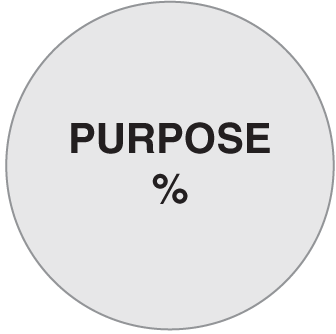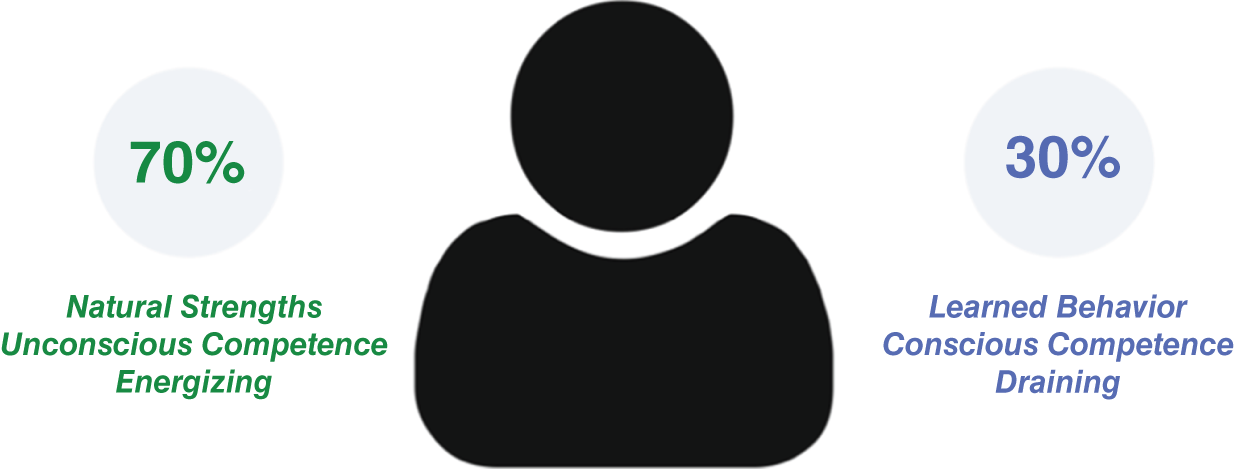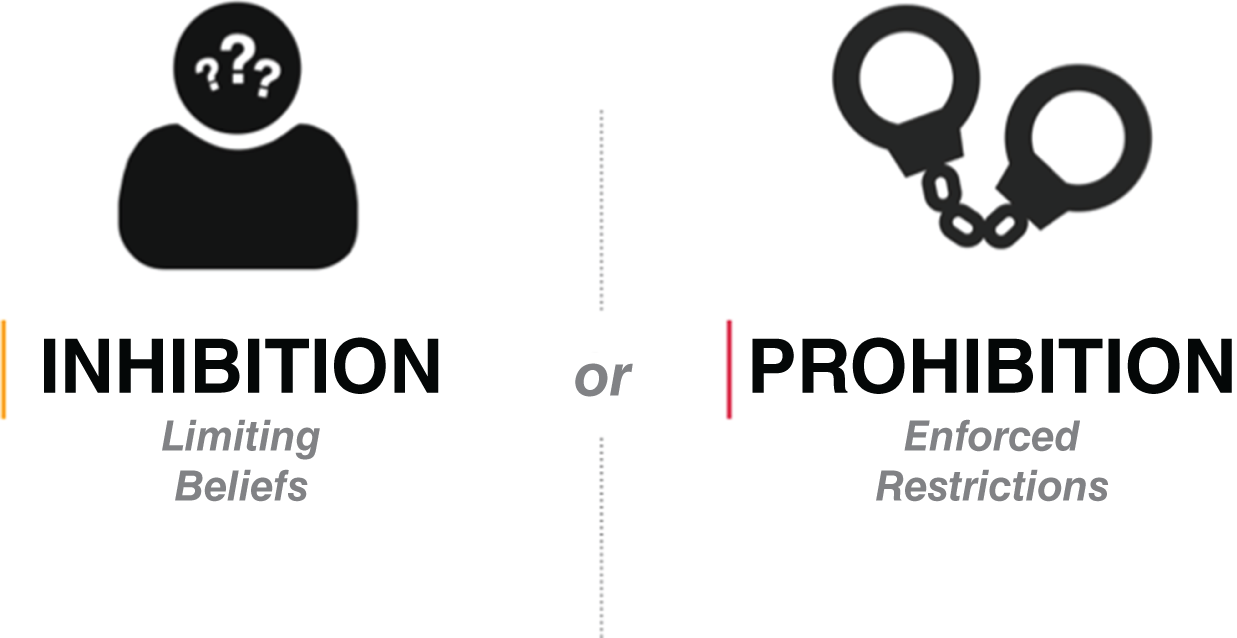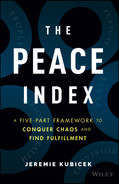CHAPTER TWO
Purpose: The Reason You Get out of Bed
As I was writing this chapter, I paused for a few hours for some regularly scheduled coaching sessions. The topic for this specific executive was her lack of Purpose. I couldn't believe it. It was perfect timing as I had been researching Purpose for weeks.
My client has worked as a sales executive for the past 17 years but feels trapped in her current role. She is friends with her company's founder but believes that her skills are much higher than her position. The problem is that she has spent her years helping this entrepreneur fulfill his dreams but doesn't have a vision for herself. She has lost her passion and can't see the vision for her life. Her current dream feels more like a nightmare at times, and she knows she can't continue to fake it.
She aligned her job title and position so close to her Purpose that her identity would be negatively affected if she were to leave. Therefore, she thinks she will lose momentum if she chooses a better Peace. I showed her that she had already lost the internal momentum—her Purpose.
This identity issue happens frequently. I have coached executives in globally respected businesses who have worked over 20 years in the company and realized that their Purpose became grafted into the company.
I have seen this happen within strong company cultures as well as those who have strong loyalties to the founders. I have met with several owner–operators of the successful Chick‐fil‐A organization who have worked 25+ years only to find that they had lost their personal vision as it became trumped by the company's vision.
The company's Purpose became theirs. That means that their identity became a VP of this or Director of that or President of whatever. The title, the organization's mission, and vision took over their identity. These people, therefore, have a difficult time imagining what life would look like without their status. It is hard to move on or leave because they don't know what to do afterward. If they leave, they lose their Purpose.
Because they are grafted in, they lose hope with the fear that their best lives—their reason for being—are behind them. That can be depressing.
Does this sound pertinent to any one of you?
Purpose Versus Responsibility
What gets you out of bed in the morning? I know, I know—an alarm. Other than that, why do you do what you do?
“I don't know,” some could say, “I just do what I am supposed to do.”
“Supposed to do” is not a Purpose. Nor is “responsibilities.” Those come after Purpose. They don't define it.
Purpose can guide life decisions, influence behavior, shape goals, offer a sense of direction, and create meaning. For most, Purpose is connected to vocation—what you do. I like to think that Purpose mixes who you are with what you do.
Purpose is more “want to” than “have to.” Are you getting out of bed every morning because you “have to” or “want to”? “I have to take the kids to school.” “I have to go to work to make money to pay for the mortgage and the car and the braces and the…” Is your Purpose tied to your responsibilities as a parent, employee, or boss? Or does your Purpose come from the core of your existence and the meaning of your life?
If “have to” is the norm, it is time to dust off your vision and work toward what you want. It might just be time to reflect on why you were born, what skills you bring to the world, and how you can fulfill your God‐given talent.
The Golden Years
You have time to figure out your Purpose. As I share stories, I don't want to cause despair, but, rather, provide perspective.
To help the executive I mentioned at the start of this chapter, I took her through an exercise I tend to use to frame the perspective of her Purpose. Why don't you join me by following this exercise as well?
For years, I have been studying the typical ages of leaders in critical roles, industries, and countries. I have discovered that the most influential years in a leader's life are between 55 and 70 years old. “What!” most will exclaim (especially the young bucks). I know that sounds preposterous but hear me out.
The average age of the president of the United States at the time of inauguration is 55.
The average age of CEOs is 59.
The average age of a U.S. congressperson is 57.
The average age of a U.S. senator is 63.
The average age of university presidents is 62.
I once had a chance to speak to the mayors of every prominent city in Germany at a hidden restaurant under the German embassy in Brussels. We were all gathered around with Munich‐style drinks, the predictable giant pretzel, and some of the best schnitzel I have ever had. I inquired about their ages and averaged them together. Want to guess what it was? Fifty‐nine years old.
The prominent positions in the world are led by those aged 55 to 70. Why is that? Precisely because they have:
- Focused on a Purpose that fits them.
- Failed and succeeded repeatedly.
- Time to focus on their Purpose as they have finally sent off those pesky kids (sort of joking).
- Money to do what they want to do.
- Influence because of their competencies and years of credibility.
- Connections with other influencers who help them with their Purpose.
What does that mean for you and your Purpose?
It means that you have time to prepare for your Purpose.
The exercise is simple. Subtract your current age from 55. The answer is how many years you have before entering your influence years. I have five. What about you? Some may have 10 years, and some may say 22 years. I also realize that some may be two years into their influence years or even more. That is perfect. It is never too late to step into your Purpose.
The sales executive I was coaching realized that there was time. She wasn't late. She could still live out her purpose even though she was frustrated for staying too long in a job that now caused her despair.
I find that most people feel relieved when they go through this exercise. It gives perspective. It helps you realize that you are in a marathon, not a sprint. You can shift your mind to prepare for the influence seasons. I find that Peace often improves on this idea alone. Marinate on this big idea—you have time to figure out your Purpose. You don't have to hurry—you can rest in hope. You can find what you were designed to do.
Calling
Of the five P words in the Peace Index, Purpose is the most important for me. It is my leading indicator, my driver. If it is off, everything else in my life is off. I must know that what I am doing matters. For others it may be People, Personal Health, or another of the P words.
Another way to describe Purpose is what I am called to do. What do I have a strong urge to do with my vocation—like a conviction? That is the level of Purpose that I have always desired.
It means that at the end of my life, I have lived out my Purpose and done what I was called to do.
My wife knew that she wanted to be a dental hygienist in kindergarten. Sure enough, she became a dental hygienist. We then had children, and her Purpose changed. She felt called to make her work the raising of our kids. That was a good, long season. However, her Purpose was not tied solely to our children. She did the hard job of dusting off her vision and Purpose. She started a company called Visionary and is now a developer of neighborhoods, event spaces, and homes.
Do you know what you were made to do?
Do you fully grasp what you are naturally gifted to do?
Do you know what you are passionate about doing?
Purpose is an ongoing journey, and callings change with the seasons.
Activating Purpose
While traveling through Asia in college, I learned a Japanese concept called ikigai. This philosophy stands for your “reason for being.” Iki means life, and gai means value or worth. Simply, it means your life's worth, or even better, your life purpose—the inspiration that gets you out of bed in the morning.
That trip led me to study this age‐old concept of understanding Purpose. Many of you have seen this diagram but may not know its origin. I have used it for decades to help people see something deeper inside of them.
I like how the process causes you to think about your Purpose. The concept focuses on:
- What you love.
- What you're good at.
- What you can be paid for.
- What the world needs.
Ikigai can be a mirror as you consider your future, especially if you feel stuck in your current season. Use this list of questions as an assessment to help you move more intentionally into your life's purpose.1 You can assess yourself by giving a score (1 to 5, with 5 being the highest) for each question. I have listed my scores below:
- What you love: (1 to 5)
- Do your passions match with your line of work?5
- Is your daily work satisfying and motivating?3.5
- Can other people see that in you? 4
- What you are good at: (1 to 5)
- Do you have influence with your colleagues regarding your work?4
- Do you feel that your work fits into your conscious competence? 5
- Would you be considered an expert in your work? 4.5
- What you can be paid for: (1 to 5)
- Is your sector or industry growing?5
- Is your specific expertise in demand?4
- Are people willing to pay you what you are worth? 4
- What you believe the world needs: (1 to 5)
- Will your work be valuable over the next 25+ years?5
- Are you solving problems that help people? 5
- Is your work or business in high demand? 4
My score is 53 out of 60 (88%). I feel as if I am in a higher season at this stage of life. I have been a lot lower and possibly a bit higher as well.
Your turn. Take the assessment to get to a reality about your Purpose.
- What you love: (1 to 5)
- Do your passions match with your line of work? ________
- Is your daily work satisfying and motivating? ________
- Can other people see that in you? ________
- What you are good at: (1 to 5)
- Do you have influence with your colleagues regarding your work? ________
- Do you feel that your work fits into your conscious competence? ________
- Would you be considered an expert in your work? ________
- What you can be paid for: (1 to 5)
- Is your sector or industry growing ________?
- Is your specific expertise in demand ________?
- Are people willing to pay you what you are worth ________?
- What you believe the world needs: (1 to 5)
- Will your work be valuable over the next 25+ years ________?
- Are you solving problems that helps people ________?
- Is your work or business in high demand ________?
The minimum score possible is 12 and the maximum score possible is 60. Answer each question with a number, 1 to 5, for each and tally the numbers for your total score.
The ikigai is one example of answering questions to help you strengthen your Purpose.
Purpose Number
Purpose in the Peace Index is focused on how good you feel about what you are designed to do.
- How clear is your sense of meaning, direction, and fulfillment in life?
- Is your work satisfying?
- Does it bring out your skills and allow you to use your superpowers?
- How fulfilled are you with the job you are doing?

After pondering Purpose, what number, 1 to 100% (100% as the highest), would you now give yourself for Purpose?
My Peace Index number acts as an indicator for when it might be time to do a deep dive into where my Purpose might be unclear or misaligned. Sometimes I realize something is off and needs adjustment. Other times I find I am right where I need to be and just need to remember the significance of my work when I have started going through the motions.
Knowing Yourself
All of us have a Purpose; some of us find it. The goal is to understand yourself so well that you can lead yourself through the process of finding the meaning of getting out of bed in the morning.
Each of us has these superpowers that are God‐given. Some of us are incredible helpers; others are builders; some are highly logical, while others can carry rooms with enthusiasm. We are all made differently for the benefit of the whole. It is a grand design to keep balance and work within the masses.
Some of us enjoy the organization we work with but may not love the role we play now, which can affect our Purpose.
Steve Cockram created a tool called 70/30 that helps people see what part of their current role they feel good about and what are the less than fulfilling areas.

Source Credit: Cockram's Law© Pub House
The ideal work level would be 70% of your time working in your sweet spot—those areas of natural strength, energizing as you do what you are excellent at doing. The other 30% would be the activities you can do but don't necessarily love. These things may be draining as you have learned how to do them, but they are not your sweet spot.
Just like the Peace Index, your 70/30 can change often. It can move to 60/40, 50/50, or fall below the line to 40/60 or worse, 30/70. It is a reality that you will drown if you are underwater too long. You can hold your breath for a while, but your Peace Index will most likely fall if your work is under 50/50 for too long.
On the other side, it can be good to get to 80/20, but if you get to 90/10, you might have a little narcissism as you might need to take out the trash a bit. The ideal is 70/30.
I have spent much of my career as a CEO around 50/50. This tool helped me immensely as I started to list my 70 and 30 and began delegating certain items and taking on others. So, let's do that here.
Your 70%: What areas in your work and or life would you say are natural strengths that energize you when you do them and make you feel that you are unconsciously competent at doing?
- ____________________________________________________
- ____________________________________________________
- ____________________________________________________
- ____________________________________________________
- ____________________________________________________
Your 30%: On the other side, what parts of your work are you doing that, while you have learned to do, drain you? These are areas you would like to do less of in your job.
- ____________________________________________________
- ____________________________________________________
- ____________________________________________________
- ____________________________________________________
- ____________________________________________________
The more secure and confident your Purpose is, the more helpful you are to those in your life and work. The more you can get into your 70% sweet spot, the more you will thrive.
My goal is to help you deal with your insecurities, frustrations, or fears. I want to help you see the areas that are off related to your Peace. That is how we work toward increasing the Peace Index.
I love how J. Donald Walters states it:
Who Says We Can't?
I remember meeting an aristocratic landowner while sitting in the famed Cliveden House when I was writing The 5 Gears. I would run into him almost daily as I spent a few hours a day in their renovated riding stables‐turned‐cafe doing my work. My friend was fascinated by who I was and what I was doing in this region of England. “Jeremie,” he said, “tell me about your family. What is your history?” I would then tell him that I grew up in a farming family and how my family moved from Prague, Czechoslovakia, to Prague, Oklahoma, to farm. I shared that we had rented a 10‐bedroom manor house across from his thousands of acres. He would chuckle as we had this consistent conversation.
The realities are that I didn't go to Eton (a famed school in England) or an Ivy League university. My family heritage is farming, and our farm in Econtuchka, Oklahoma, is over 100 years old, which is one of the reasons we moved from London back to Oklahoma.
One of the attributes of Oklahoma is that it is filled full of pioneers who share the attitude of “Who says we can't?!” If you can make it in Oklahoma, you can make it anywhere, especially when you study the historical hardships of this land.
I liked the concept so much that we created a visual tool to help people step into their Purpose. It is fittingly called, Who Says You Can't?
I started saying this to myself when I was 21 years old, starting companies in Moscow with my business partners. It was a constant refrain as I traveled back and forth to the United States, merging businesses for our distribution company. The same thinking happened when we launched a global simulcast, moved to London, built a neighborhood, and started launching scalable SaaS (subscription model) tech companies.
There is a strange dilemma with most people I have helped, including myself. Most people have limiting beliefs. While living in Atlanta, I experienced interesting social dynamics in the South tied to family history. I would often hear, “So, what does your family do?” It was as if success came from family heritage. I experienced this to the extreme while living in London. “Tell me about your family” meant quite a lot as family heritage was tied to a caste‐like system around heritage, schooling, and occupation.

© Pub House
Who says you can't? asks you if your desire to accomplish something has any 1) inhibition, which is limiting beliefs, or 2) prohibition, which are enforced restrictions.
Most people don't think they are allowed to do certain things—thinking they are prohibited. The reality is that most people are inhibited. The limiting beliefs inside them keep them from ever experiencing true Peace.
One of our GiANT consultants, Jay Sampson, shared this story about one of his clients that highlights this point.
As I met with a client with a team of three, some fatigue was pretty apparent. As they took the Peace Index, I was surprised to hear the totals of 62%, 55%, and 43%, respectively. As we dove into the numbers, one of the participants knew that her People category was low but couldn't comprehend how Purpose had gotten so low.
One of the participants was doing AR / AP for a medical company and had moved from Arizona to Oklahoma to avoid a toxic relationship. She is a certified Holistic Nutritionist doing financial work, and while she is good at it, it isn't her Purpose. As we dug in deeper, we identified the resistance which was inhibiting her—she needed more certifications to perform specific procedures. I kept asking her why those facts meant she couldn't do the work she enjoyed since she knew what she needed to do to get certified. We finished that meeting and scheduled the next one.
At the start of the next meeting, she said (and I quote), “I felt like last time, you were telling me to get my act together. So, I did some research. And I don't have to have a four‐year degree to do some of the work. I need a two‐year degree. And I already have most of that completed. Also, I thought it through, and I could take on some clients on the weekend—I have time—and generate some extra income that would be very helpful. AND I can continue doing a job that is easy for me because I am good at it and working with a team that I enjoy.” I realized that most of my clients need a sounding board to help them see what is right in front of them.
What are the limiting beliefs keeping you from stepping into your true Purpose? Wouldn't that be silly if a petty fear kept us from really doing what we are designed to do?
So, when you get out of bed in the morning ask yourself: “What was I designed to do today? How can I live out my Purpose today?”
When we step into our Purpose—the mix of who we are with what we do—we will find more profound levels of Peace. We need people who care for us to help us—to call us up and not out. The next chapter will show us how healthy our People levels are and how we can make them better.
Note
- 1 This list is a modified version of the list found at https://www.betterup.com/blog/what-is-ikigai.
